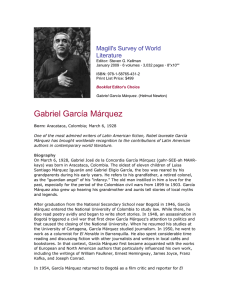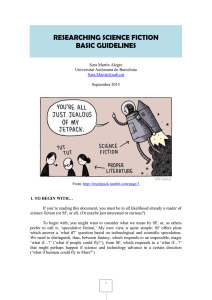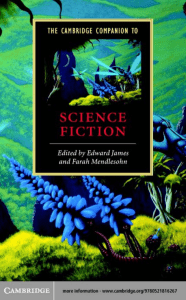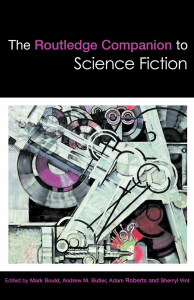Journalism and/or Fiction: The Worlds of Gabriel Garcà a Márquez
Anuncio
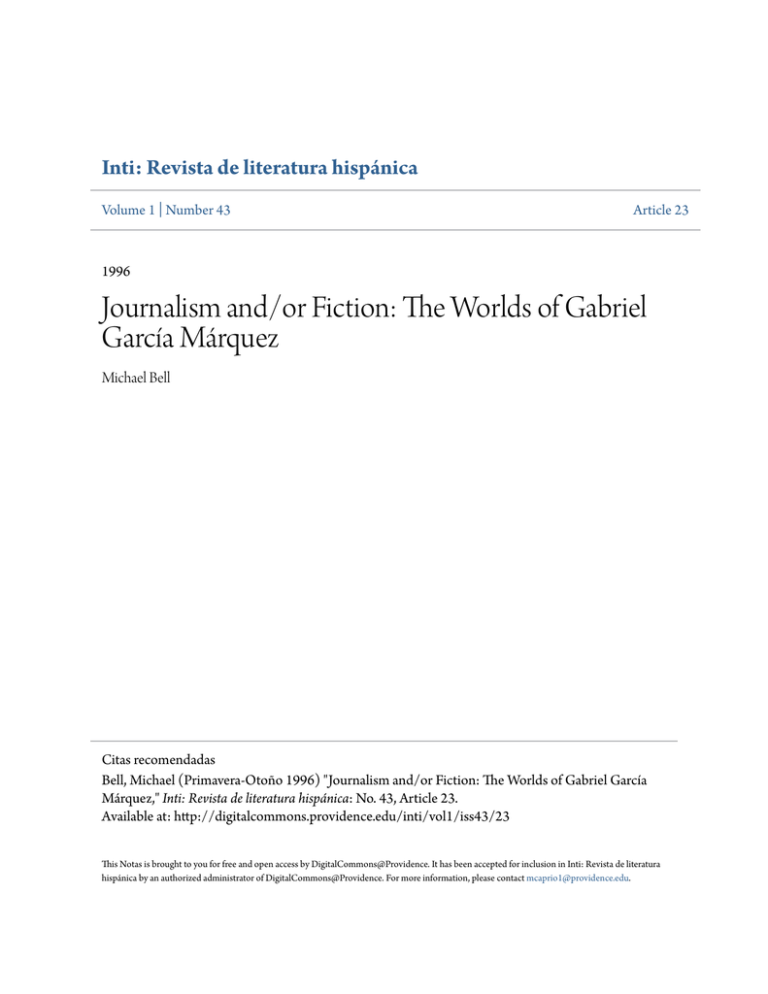
Inti: Revista de literatura hispánica Volume 1 | Number 43 Article 23 1996 Journalism and/or Fiction: The Worlds of Gabriel García Márquez Michael Bell Citas recomendadas Bell, Michael (Primavera-Otoño 1996) "Journalism and/or Fiction: The Worlds of Gabriel García Márquez," Inti: Revista de literatura hispánica: No. 43, Article 23. Available at: http://digitalcommons.providence.edu/inti/vol1/iss43/23 This Notas is brought to you for free and open access by DigitalCommons@Providence. It has been accepted for inclusion in Inti: Revista de literatura hispánica by an authorized administrator of DigitalCommons@Providence. For more information, please contact [email protected]. JOURNALISM AND/OR FICTION: THE WORLDS OF GABRIEL GARCIA MARQUEZ M i c h a e l Bell University of W a r w i c k , Coventry, E n g l a n d In the l o n g and t h o r o u g h introductions t o his f o u r v o l u m e edition of García M á r q u e z ' journalistic writing, Jacques Gilard has unfolded the developing and m u l t i - f a c e t e d relationship b e t w e e n the j o u r n a l i s m and the fiction.1 A c r o s s the w i d e range of his journalistic output, f r o m the c o m i c p e r s o n a of S e p t i m u s of the ' J i r a f e ' c o l u m n in El Heraldo of Barranquilla t h r o u g h to h i s e x t e n d e d investigative reporting, García M á r q u e z can b e seen d e v e l o p i n g the skills of style and narrative, the blend of h u m o r and political critique, w h i c h b e c a m e the s u b s t a n c e of his fiction. I d o n o t w i s h to c h a n g e a w o r d of G i l a r d ' s account of the positive, f o r m a t i v e significance of the j o u r n a l i s m to the fiction except p e r h a p s f o r h i s d e c l a r a t i o n that no hay diferencias notables entre los plantamientos del periodista y los del escritor (IV, 59). F o r it is i m p o r t a n t to r e c o g n i z e that the i m p a c t of the j o u r n a l i s t o n the writer acquires its positive v a l u e partly u n d e r a n e g a t i v e sign. A s a h i g h l y s u c c e s s f u l j o u r n a l i s t w h o w a s also an aspirant novelist, García M á r q u e z was especially aware of the differences b e t w e e n t h e s e m o d e s and the t e n s i o n b e t w e e n them is a significant, although partly subterranean, p r e o c c u p a t i o n of his o e u v r e . T h e continuing, n a g g i n g p r e s e n c e of this question f o r G a r c í a M á r q u e z has a n u m b e r of c a u s e s but it p e r h a p s arises m o s t f u n d a m e n t a l l y f r o m his sense of the c o m m o n root of j o u r n a l i s m and fiction, at least in his case, as f o r m s of truthtelling. In La mala hora, f o r e x a m p l e , the b a r b e r finds the b a n on political c o n v e r s a t i o n almost literally stifling. W h e n asked w h y h e risks such talk h e says uno está que revienta por h a b l a r . 2 T h e physicality of the p h r a s e echoes a h u m o r o u s article b y García M á r q u e z o n the subject of j o u r n a l i s m w h e r e h e says el periodismo es una necesidad biológica del hombre. (III, 911) Journalism, in other w o r d s , e x p r e s s e s a f u n d a m e n t a l h u m a n need to s p e a k about w h a t is g o i n g on in t h e world. At the s a m e time, the b a r b e r ' s r e m a r k s , a l o n g with similar hints in the story, link the l a m p o o n s , w h i c h are the principal narrative m o t o r of La mala hora, to the creative impulse u n d e r l y i n g the tale. Is the tale 270 INTI N° 43-44 itself a kind of l a m p o o n ? A r e the l a m p o o n s a primitive f o r m of fiction?3 T h i s parallel is, of course, reinforced b y the a m b i g u o u s authorship of the l a m p o o n s . W i t h i n the realistic world of the narrative their authorship is n e v e r revealed so that they are left floating a m b i g u o u s l y b e t w e e n a realistic e x p l a n a t i o n w h i c h h a p p e n s not to b e supplied or their b e i n g understood as an authorial s y m b o l i s m and thereby insisting o n the fictive n a t u r e of the whole. T h e generic variety within G a r c í a M á r q u e z ' j o u r n a l i s m reflects this larger point. T h e r e is a l w a y s a d e e p continuity of impulse b e t w e e n the j o u r n a l i s m and the fiction. B u t the continuity of the creative impulse, and the fluidity of the generic distinctions across the range of his writing, m a d e it m o r e , rather than less, n e c e s s a r y f o r G a r c í a M á r q u e z to arrive at an u n d e r s t a n d i n g of the d i f f e r e n c e b e t w e e n his writing practices. T h i s c o m p l e m e n t a r y truth is equally e v i d e n t in the episode f r o m La mala hora, f o r if the. l a m p o o n s express the u n d e r l y i n g i m p u l s e of b o t h j o u r n a l i s m and fiction, and thereby suggest a parallel b e t w e e n the b a r b e r ' s n e e d to talk politics and the creation of the containing narrative, it is equally true that these parallels d e p e n d o n o u r sense of the d i f f e r e n t o r d e r s w h i c h are involved. T r u e parallels, after all, d o not meet. Or, m o r e strictly, they m e e t in infinity or in the obscure origins of artistic creation. T o nest the j o u r n a l i s m / f i c t i o n t h e m e within an overt fiction, t h e r e f o r e , is to highlight d i f f e r e n c e as well as continuity. And f r o m this point of view the a m b i g u o u s p r o v e n a n c e of the l a m p o o n s serves to m a i n t a i n t h e generic distinction. I h a v e discussed at length e l s e w h e r e h o w this generic tension of continuity and d i f f e r e n c e p e r v a d e s the w h o l e of G a r c í a M á r q u e z ' fiction m o d u l a t i n g f r o m a f o c u s o n j o u r n a l i s m and fiction in the earlier n o v e l l a s to the grander t h e m e of history and fiction in the later novels. 4 O n the present o c c a s i o n I w a n t to c o n s i d e r h o w a similar tension is t h e m a t i z e d , s o m e t i m e s p e r h a p s only half consciously, in the j o u r n a l i s m . F o r j u s t as the fiction distinguishes itself f r o m the political c o m m e n t a r y w h i c h is its partial motive, so the journalism highlights the fictional aspect of political reality. W h a t is at stake is a m e t a p h y s i c a l q u e s t i o n rather than the t h e m a t i c and narrative c o n c e r n s ably discussed b y Gilard. In his early j o u r n a l i s m particularly, G a r c í a M á r q u e z m e t the d e m a n d f o r a constant stream of h u m o r o u s invention b y recourse to s o m e f o r m u l a i c devices. O n e d e v i c e w a s to take a c o m m o n idea or expression and subject it to c o m i c variation s u c h as inverting it, e x t e n d i n g it, or j u s t taking it literally. In an article of A u g u s t 1952, entitled Lugares comunes, he m a k e s this d e v i c e his explicit t h e m e . H e begins: La literatura, desde sus comienzos, y ahora el cine y las tiras cómicas, han traído al mundo una serie de lugares comunes que bien valdría la pena modificar, aunque sea para ver qué pasa. (I, 813) Literature is put o n a f o o t i n g with c o m i c strips here b e c a u s e f u n c t i o n a l l y it is e q u a l l y p r o d u c t i v e of stereotypes, but also b e c a u s e G a r c í a M á r q u e z ' o w n MICHAEL BELL 271 literary interest is a l w a y s strongly anchored in the p o p u l a r imagination; not just, that is to say, in the folkloric but in the f o r m s of e v e r y day, m o d e r n urban c o n s c i o u s n e s s including its m e d i a t i o n t h r o u g h the press, television and film. A l t h o u g h h e admired the artistic d e d i c a t i o n of Flaubert, G a r c í a M á r q u e z distanced h i m s e l f f r o m the Flaubertian attitude to the i d é e r e ç u e , at least at the p o p u l a r level, as w a s to b e c o m e elaborately e v i d e n t in El amor en los tiempos del cólera. His p l a y with c o m m o n p l a c e s , t h e r e f o r e , is not in any simply d e s t r u c t i v e spi lit although it includes a m e a s u r e of the deconstructive. It is m o s t typically a h u m o r o u s l y a f f e c t i o n a t e e x a m i n a t i o n of those c o m m o n e x p r e s s i o n s w h i c h h o v e r o n the brink of n o n - m e a n i n g and can o n l y b e g r a s p e d , if at all, with a s y m p a t h e t i c participation. H e n c e e v e n in the present case, w h e r e the principal b u r d e n of the p i e c e is to e x p o s e the cliché, the e f f e c t is still h u m o r o u s l y creative as G a r c í a M á r q u e z i m a g i n e s the reality w h i c h a particular cliché implies: Un lugar común en las tiras cómicas el pescador infortunado que aguarda un día entero, pacientemente, a que el pez muerda el anzuelo. Al final, el pescador, invariablemente, pesca una bote inservible. Los mares y los ríos y hasta los simples estanques de las tiras cómicas, estan llenas de botas... (I, 814) T o e x p l o d e the cliché h e r e he e x p a n d s it within its o w n h u m o r o u s premises. His m e t h o d is to create the world according to cliché and that suggests w h y a particularly significant b o d y of cliché f o r him is precisely that s u r r o u n d i n g the w o r d ' w o r l d ' itself. E v e n as recently as A u g u s t 1993, in a short speech h o n o r i n g his friend, the p o e t A l v a r o Mutis, G a r c í a M á r q u e z uses o n five d i f f e r e n t o c c a s i o n s expressions t u r n i n g o n the w o r d ' w o r l d ' . 5 T h i s has b e e n a feature of his j o u r n a l i s t i c writing t h r o u g h o u t his c a r e e r and, although it is o b v i o u s l y c o n s c i o u s o n e a c h occasion, I find it difficult to credit that h e is always a w a r e at the time of the f r e q u e n c y with w h i c h h e plays o n this w o r d . It rather has the revelatory implication of an u n c o n s c i o u s habit. It is as if he w e r e constantly turning o v e r at s o m e subliminal level a set of questions about what it m e a n s to inhabit a world. F u r t h e r m o r e , in so f a r as cliché represents a m i n i m a l d e g r e e of individual thought it m a y b e the m a n i f e s t a t i o n of a collective linguistic u n c o n s c i o u s . In his play with this b o d y of cliché, therefore, G a r c í a M á r q u e z is exploring the constant, implicit h u m a n activity of w o r l d creation and h e d o e s so in a popular, h u m o r o u s and a b o v e all relativistic spirit. S o m e e x a m p l e s will c l a r i f y the possibilities. Central to this b o d y of cliché is the e x p r e s s i o n ' t h e m o s t X in the w o r l d ' . A n article o n the M i s s U n i v e r s e c o m p e t i t i o n of 1954, f o r e x a m p l e , turns o n the e m p t i n e s s of this expression. He speaks of the f i a n c é of the n e w M i s s U n i v e r s e : ... que conoció, conmovido, la noticia de que, súbitamente, su novia había sido declarada oficialmente la mujer más bella del mundo, tal como él lo había creído siempre sin haber logrado convencer a muchos. (III, 907) 272 INTI N° 43-44 B y t a k i n g it literally G a r c í a M á r q u e z catches the v a c u i t y and the multiple vulgarity of the notion of the m o s t b e a u t i f u l w o m a n in the w o r l d , and his earlier p a s s i n g r e m a r k that the winner, the A m e r i c a n contestant, has b e e n l i g e r a m e n t e b r o n c e a d a b y the C a r i b b e a n s u n hints at an inherent c o n c e p t u a l f l a w in the implicit appeal to a world standard. Y e t the very critique of the p h r a s e s i m u l t a n e o u s l y expresses an a c c e p t a n c e of it as an item of p o p u l a r e m o t i o n a l rhetoric. F o r h e r f i n a c é , she is indeed the m o s t b e a u t i f u l girl in the w o r l d j u s t like the e n d l e s s succession of the m o s t w o n d e r f u l girls in the world o n t h e old f o r c e s favourites p r o g r a m m e s . T h e expression b e c o m e s m e a n i n g f u l only at the point w h e r e it b e c o m e s c o m p l e t e l y private, w h e r e it ceases to h a v e r e f e r e n c e to t h e w o r l d at all. In this respect this p h r a s e is a m e e t i n g point f o r G a r c í a M á r q u e z ' abiding t h e m e s of solitude and solidarity; it j u x t a p o s e s the i n c o m m e n s u r a b l e scales of the private and t h e global. F o r the f u l l f o r c e of his play o n this e x p r e s s i o n lies in his b e i n g a m a n with a truly world outlook w h o constantly n e e d s to u s e the s a m e e x p r e s s i o n in a c o m p l e t e l y literal sense. In the w a k e of the S u e z crisis, f o r e x a m p l e , h e w r o t e an article o n Aristotle Onassis entitled Cuando el mundo pierde solo esta hombre gana. H e r e he refers quite literally to a world context a l t h o u g h h e g o e s o n to exploit an ironic ambiguity in the p h r a s e t o d o el m u n d o w h i c h inflects a g e o g r a p h i c a l s c o p e into political o p p o r t u n i s m : Su mejor negocio fue la Segunda Guerra Mundial. Su pequeña flota, con bandera neutral, navegó por todos los mares con petróleo para todo el mundo. (IV, 449) A n d a f t e r N a s s e r ' s nationalization of the S u e z canal, Onassis ordenó la construcción del petrolero más grande del mundo, 100.000 toneladas. Here the ring of e m p t y h y p e r b o l e in the cliché lingers around the literal r e f e r e n c e a f f i r m e d b y the statistic. T h e expression inflates the boat to a kind of g r a n d i o s e unreality, w o r t h y of the Patriarch, e v e n while soberly reporting t h e fact, and the logic, of its existence. T h e p h r a s e , w e m i g h t say, allows G a r c í a M á r q u e z to p r e s e n t reality h e r e u n d e r the sign of unreality. E l s e w h e r e it e x p r e s s e s the relativity of w o r l d s . H e r e m a r k s , f o r e x a m p l e , of the S h a h of Persia in O c t o b e r 1956: Personalmente, es lo que se llama un hombre de mundo en el occidente... (IV, 417). T h e final t h r e e w o r d s , c o m i n g a f t e r the phrase h o m b r e de m u n d o , quietly d e f l a t e the e x p r e s s i o n w i t h o u t detracting f r o m the personal dignity of the Shah. O n c e again, the e x p r e s s i o n of a personal truth or value requires the term m u n d o e v e n w h i l e h o l l o w i n g out the w o r d ' s claims to a substantive m e a n i n g . T h i s e v a c u a t i o n of m e a n i n g is strikingly developed in a p i e c e f r o m April 1 9 5 0 about o n e Garry D a v i s w h o resigned his A m e r i c a n citizenship to declare h i m s e l f ' t h e first citizen of the w o r l d ' . It is n o w e v i d e n t w h y this fait divers t o u c h e d a central n e r v e in G a r c í a M á r q u e z ' s imagination. F r o m his o p e n i n g MICHAEL BELL 273 sentences h e takes the p h r a s e 'citizen of the w o r l d ' literally and t h e r e b y drains it of m e a n i n g : Cuando la ONU se reunió en París, nació el primer ciudadano del mundo. Y nació a diferencia de los otros mortales, mayor de edad, fuerte y convenientemente alimentado. (I, 257) P l a y i n g o n the i m a g e of natural birth b e f o r e revealing its p u r e l y m e t a p h o r i c a l u s a g e , G a r c í a M á r q u e z e x p o s e s the p h r a s e ' c i t i z e n s h i p of the w o r l d ' as an unreality w h i c h t h e n in turn reflects o n the world e f f i c a c y of the U N and the m e a n i n g f u l n e s s of citizenship at large. Political reality is constantly p e r v a d e d b y p o t e n t unrealities w h i c h h e e x p o s e s b y treating t h e m as if they w e r e real. I h a v e r e m a r k e d e l s e w h e r e h o w h e plays with these s a m e verbal f o r m u l a e to s u p e r i m p o s e the i n c o m m e n s u r a b l e scales of t h e local and the global; a d o u b l e c o n s c i o u s n e s s w h i c h is crucial to Cien años de soledad.6 At present, I e m p h a s i z e a d i f f e r e n t aspect: his i n t e r w e a v i n g of reality and unreality, his habit of turning the real world inside out. G a r r y Davis is a truly M a r q u e s i a n c h a r a c t e r w h o literalizes the u n r e a l t o c o m m e n t o n the real. T h a t h e should also h a v e been, as it w e r e incidentally, an historical individual only enriches the point. T h i s inversion of w o r l d s w a s n o idle g a m e f o r García M á r q u e z w h o realized o n l y too well that the reader is not m o v e d by f a c t b y 1' effet du réel. S p e n d i n g his apprentice years in a t i m e of political terror and p e r c e i v i n g the realistic n o v e l a d e la Violencia as inadequate, h e w a s obliged to t a k e the g a m e of fiction v e r y seriously. In an article of J u n e 1954 h e c o m m e n t s ironically o n the naive habit of the C o l o m b i a n reading public of d i s c u s s i n g the possible historical originals of fictional characters. Allí mismo, como quien dice, a la vuelta de la esquina, está todavía el olor a pólvora de la guerra de independencia, y sin embargo es motivo de controversia la identidad de un personaje literario que de haber existido sería apenas una distinguida y longeva matrona de un ciento de años, o un hermoso recuerdo de veinte años, con ochenta de yacer en su sepultura. (III, 892) T h e p a s s a g e is a g o o d e x a m p l e of the d o u b l e significance, positive and negative, of the j o u r n a l i s m to the fiction. On the o n e hand, the r e f e r e n c e s to the lingering w h i f f of g u n p o w d e r and the h u n d r e d y e a r old m a t r o n , as well as the final n o t e of mortality, suggest Ursula B u e n d í a and the f a t e f u l historical c o n d e n s a t i o n of Cien años de soledad. Yet G a r c í a M á r q u e z , in i m a g i n i n g the a f t e r l i f e of the heroine, is o n c e again e x p o s i n g an unreal p o t e n c y by entering its terms; in this case the Quixotic error of literalistic reading. L i k e Cervantes, h e h a s n o easy a n s w e r to the f u n d a m e n t a l p r o b l e m a t i c of fictional m e a n i n g and p o w e r but he illuminates and negotiates it b y a constant a w a r e n e s s of c o m m o n errors. A n d so h e g o e s o n to note the other side of the question: that the u r g e n t realism of the n o v e l s of La Violencia has g o n e u n h e e d e d : 274 INTI N ° 43-44 ... los novelistas de "la violencia"—que de algún modo hay que llamarlos — se esmeran en demostrar que sus personajes son absolutamente reales, y hay muy pocos lectores que dan crédito a sus testimonios. T h e paradox of fiction, that its power of emotional persuasion is greater than that of fact, w a s a creative problem and opportunity for García M á r q u e z which his journalism, with its direct responsibility to reality, first forced him to recognize and then taught him to exploit throughout his oeuvre. In his early fiction elements of fantasy act as necessary distancing f r o m a too naturalistic or testimonial texture. In Cien años de soledad this whole problematic is finally thematized by the narrative itself within the appropriately Cervantean f r a m e of the fictitious historian. But as García M á r q u e z remarks in his conclusion to this article, the ultimate achievement in the art of turning the real world inside out is to produce a mirror i m a g e so exact that its virtuality, its fictional condensation, is not even noticed although its p o w e r is felt: Que se creen nuevos personajes en la literatura colombiana, que es eso lo que importa, aunque no sean copias textuales de la vida real, sino mejor si son puras y maravillosas criaturas fantásticas. Aunque los escritores colombianos, para evitar confusiones, tengan que advertir en el futuro: "Cualquier parecido o semejanza entre personajes de esta novela o personajes de la vida real, no es pura coincidencia, sino el resultado de un laborioso esfuerzo del autor". (p. 893) T h i s ambition to close the g a p of appearances, and to give an evident fiction the force of reality, is ultimately realized in some of García M á r q u e z ' late fiction. T h e w h o l e narrative of Crónica de una muerte anunciada, of course, turns o n the question of coincidence whereby fiction and life have b e c o m e scandalously indistinguishable both for the narrator and f o r his predecessor the e x a m i n i n g magistrate. But the most distinguished, and world historical, instance is El general en su laberinto, where Bolivar's Quixotic utopia of regional solidarity is treated in a m o d e of sober, even downbeat, realism in sharp contrast to the magical charm of Cien años de soledad. But here perhaps M á r q u e z is at his m o s t cunning in nudging the reader to start the whole process again, to turn the world of this historical fiction inside out, and to see B o l i v a r ' s Utopian fantasy of regional solidarity and liberation as a still possible historical reality. MICHAEL BELL 275 FOOTNOTES 1 Obra Periodística, ed. Jacques Gilard, Vol. 1 Textos Costeños, Vol. II Entre Cachacos I, Vol. III Entre Cachacos II, Vol. IV De Europa y América (1955-1960) (Barcelona, Bruguera, 1982). 2 La mala hora (Barcelona, Plaza y Janés, 1974) p. 50. 3 For an ingenious, perhaps too ingenious, discussion of this see Wolfgang A. Luchting 'Lampooning Literature, La mala hora' in McMurray George R., ed., Critical Essays on Gabriel García Márquez (Boston, Hall, 1987) pp. 93-102. 4 Gabriel García Márquez: Solitude and Solidarity (London, Macmillan, 1993). 5 El Tiempo Bogotá, Sunday, August 29, 1993, pp. 10-120. 6 Gabriel García Márquez op. cit., pp. 52-57.

